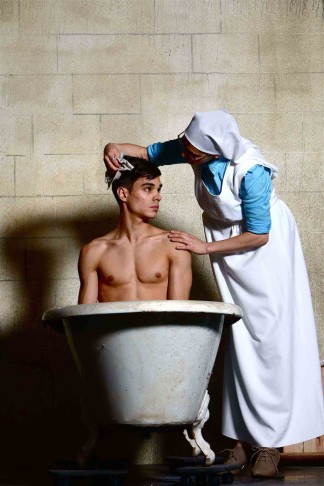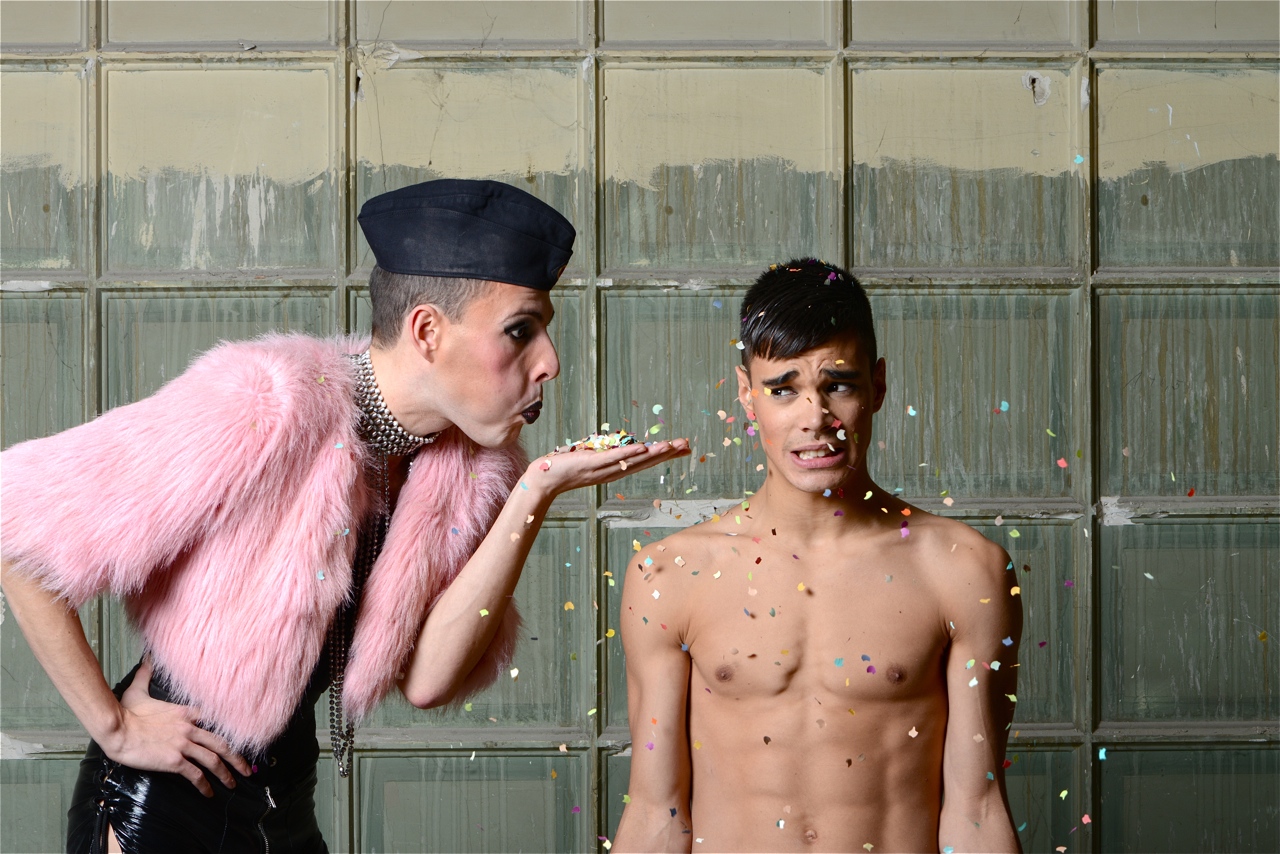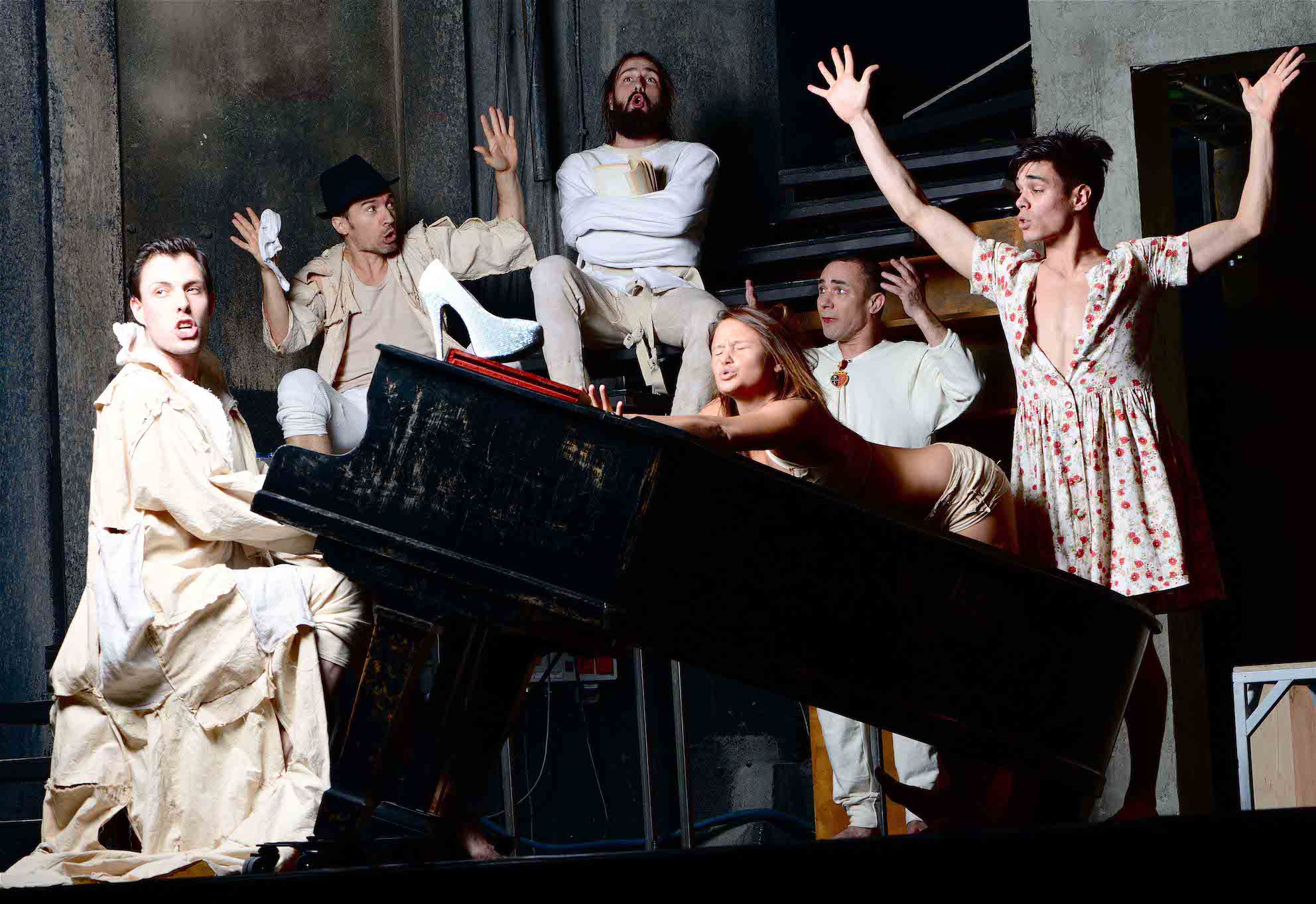Kevin Clarke
Operetta Research Center
18 August, 2014
We have been talking about burlesque and boylesque a lot here, lately. But have you ever heard of “Berlinesque”? And, for that matter, of an “Artistical”? If not, you might want to acquaint yourself with an “artistic musical” called Der helle Wahnsinn, playing at Berlin’s famous Wintergarten Varieté in Potsdamer Straße. It takes a glimpse at German history in the year 1947, with a story set in a mental asylum, revolving around a young man locked up because of Paragraph 175, the notorious anti-gay law.

“Der helle Wahnsinn”: Scene with David Pereira as cross-dressing Punka. (Photo: R. Pater/Wintergarten)
Der helle Wahnsinn, written by Markus Pabst (book), Jack Woodhead (music) and David Pereira (lyrics) is a classic back-stage musical, only that this version is set in a mental hospital where the patients – under the guidance of the flamboyant Herbert Maria Freiherr von Heymann (Woodhead) – prepare a revue to be filmed by an American news program. This revue, and the fact that the patients all hope to be discovered by an American talent agent and taken to the USA, is the basic story line. The emphasis is on “basic.”
In the course of two acts you get one acrobatic number after the other, some more convincing (Florian Zumkehr doing hoop diving for example) some a little less (pumped up Rummelsnuff doing a muscles and Mozart number), but they all work well together and are endearing. The music is not really evocative of the immediate post-war period. It could be labeled “General Musical Comedy” with some great songs, such as “Rainbow Over Berlin,” but little feeling for time and locale.
The burlesque element is a striptease by Australian performer Sara Bowden, who is familiar to Berlin’s operetta audiences from the “Ball im Savoy” production at the Komische Oper, where Miss. Bowden was the alternative cast to Katharine Mehrling.
Here, she performs “Strip in 2,31“ which is a hillarious strip number lasting two and a half minutes, exactly. Another burlesque element is the use of familiar material in a new context. In addition to the songs written by Jack Woodhead some very famous numbers pop up, from “Lili Marleen” to various Hans Albers sea faring songs which Mr. Rummelsnuff sings in a deep raspy bass voice. But without Mr. Albers trademark charm.

The two stars and the two authors, David Pereira (r.) and Jack Woodhead. (Photo: R. Pater/Wintergarten)
The novelty of it all, you might say, is the inclusion of Paragraph 175 in post-war Germany, which is a topic currently hotly debated. You might remember that the Nazis reinforced the paragraph, and while many prisoners of concentration camps were freed by the allied forces in 1945, the pink triangle prisoners went straight back into cells because they were labeled “degenerates” and “perverts.”
Especially with the newly founded German Democratic Republic being governed from Bonn – in the Catholic Rhine land area – the church and its conservative morals became state law and stayed state law, in the form of the especially severe Nazi version of §175.
This went on until 1969, a very dark spot in Germany’s history. And one causing a lot of discussion in recent years when many people asked why the law wasn’t changed earlier, why gay men imprisoned by the Nazis did not receive any compensation (as all other groups did, including the Jews), why the Supreme Court ruling in favor of anti-gay Nazi laws cannot be declared a mistake etc. etc.?

The entire cast of “Der helle Wahnsinn”. (Photo: R. Pater/Wintergarten)
To have an entire show dedicated to this delicate topic is laudable. Der helle Wahnsinn is not as emotionally gripping as, let’s say, Jake Heggie’s one-act opera For a Look or a Touch (2011) which was recently performed in Berlin. But it is an interesting show nonetheless, and offers actors and acts that widen the current understanding of what operetta could be in Berlin. Der helle Wahnsinn expands on what Barrie Kosky does at the Komische Oper, and what the lords and masters at the Tipi Zelt or Bar jeder Vernunft offer. It is a welcome addition. It is a show that’s ideal for anyone who wants something with an “Over the Rainbow” Berlin feeling, where operetta, burlesque and musical comedy get happily mixed together.
Playing till the beginning of October 2014.
